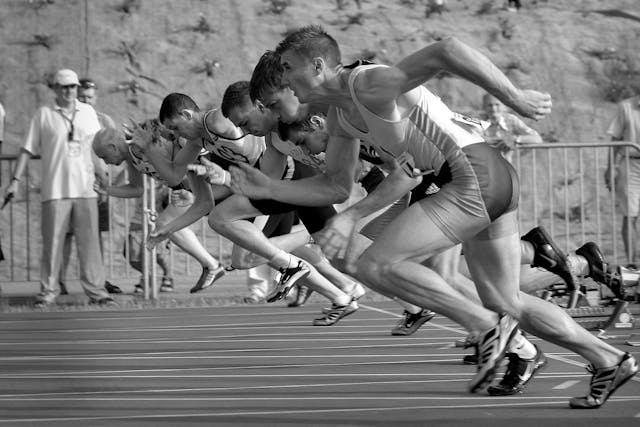
Positive psychology is the scientific study of what makes life most worth living.
It focuses on the strengths and virtues that enable individuals to thrive, including athletes.
By incorporating positive psychology principles into their training and performance, athletes can enhance their mental and emotional well-being, leading to improved athletic performance.
Benefits of Positive Psychology Techniques for Athletes
Implementing positive psychology techniques can have profound benefits for athletes across various aspects of their lives and performance:
Improved mental well-being
Athletes often face immense pressure to perform, which can lead to stress, anxiety, and other negative emotions.
Positive psychology techniques, such as mindfulness and cognitive reframing, provide athletes with tools to manage these emotions effectively.
By cultivating a positive mindset and learning to focus on the present moment, athletes can experience better mental health and overall well-being.
Enhanced performance
Positive psychology emphasizes the power of positive emotions and mindset in driving performance.
Athletes who adopt a growth mindset—believing that abilities can be developed through dedication and hard work—tend to approach challenges with resilience and determination.
By focusing on continuous improvement rather than fixed abilities, athletes can unlock their full potential and achieve higher levels of performance on the field.
Increased resilience
Setbacks are inevitable in sports, whether it’s dealing with injuries, losses, or periods of poor form.
Positive psychology techniques teach athletes to view these setbacks as opportunities for growth rather than failures.
By cultivating grit and resilience, athletes can bounce back from setbacks stronger than before, equipped with valuable lessons learned from adversity.
Better relationships
Positive psychology fosters a supportive and encouraging team environment, where athletes, coaches, and support staff collaborate towards common goals.
By cultivating empathy, gratitude, and effective communication skills, athletes can build stronger relationships within their team, leading to improved cohesion and morale.

Long-term well-being
In a culture often fixated on winning at all costs, positive psychology reminds athletes to prioritize their long-term well-being over short-term outcomes.
By focusing on the process of improvement rather than solely on results, athletes can maintain a healthy perspective on their sport and avoid burnout or disillusionment.
Optimal performance
Positive psychology techniques can help athletes achieve a state of flow, where they experience effortless concentration and peak performance.
By fully immersing themselves in the present moment and finding joy in the process of competition, athletes can tap into their full potential and perform at their best when it matters most.
Personal growth
Positive psychology encourages athletes to focus on developing their strengths and talents, rather than dwelling on weaknesses.
By leveraging their unique abilities and qualities, athletes can build confidence, vitality, and resilience, leading to improved self-esteem and better performance on and off the field.
Better coping skills
Stress and adversity are inevitable in sports, but positive psychology equips athletes with effective coping strategies to navigate these challenges.
Practices such as mindfulness, gratitude, and visualization help athletes manage stress, regulate emotions, and maintain a positive outlook even in the face of adversity.
Improved focus
Positive psychology techniques teach athletes to stay present-focused and maintain a positive mindset, even in high-pressure situations.
By managing distractions, controlling negative thoughts, and staying grounded in the moment, athletes can enhance their focus, confidence, and decision-making abilities during competition.
Enhanced enjoyment
Ultimately, sports should be a source of joy and fulfillment for athletes.
Positive psychology techniques can help athletes rediscover their love for their sport by fostering a sense of enjoyment, purpose, and meaning in their athletic endeavors.
By finding fulfillment in the journey rather than solely in the outcome, athletes can sustain their passion for their sport and enjoy long-term success and well-being.

Key Areas of Positive Psychology for Athletes
Positive psychology offers athletes valuable tools and techniques to enhance their mental well-being and performance.
Here are key areas of positive psychology that athletes can focus on:
Gratitude
Cultivating gratitude involves acknowledging and appreciating the positive aspects of one’s life and experiences.
For athletes, practicing gratitude can have profound effects on their mood, motivation, and overall well-being.
By recognizing the hard work, support, and opportunities that contribute to their athletic journey, athletes can develop a greater sense of fulfillment and satisfaction.
Gratitude also fosters resilience by shifting the focus from what is lacking to what is present, empowering athletes to overcome challenges with a positive mindset.
Mindfulness
Mindfulness practices involve bringing awareness to the present moment with acceptance and non-judgment.
For athletes, mindfulness techniques such as meditation, deep breathing, and body scans can be invaluable tools for managing stress, enhancing focus, and regulating emotions.
By training the mind to stay grounded in the present, athletes can minimize distractions, reduce anxiety, and perform at their best, even in high-pressure situations.
Mindfulness also promotes mental clarity and emotional resilience, enabling athletes to bounce back from setbacks with greater ease.
Strengths-based approach
A strengths-based approach focuses on identifying and leveraging one’s inherent strengths and talents.
By recognizing and developing their unique abilities, athletes can build confidence, resilience, and a sense of purpose in their athletic pursuits.
Rather than fixating on weaknesses or areas of improvement, athletes can channel their energy into maximizing their strengths, leading to greater satisfaction and success on and off the field.
Embracing a strengths-based mindset also fosters a positive self-image and encourages athletes to approach challenges with optimism and determination.
Positive self-talk
Positive self-talk involves cultivating an inner dialogue characterized by encouragement, self-compassion, and resilience.
Athletes can harness the power of positive self-talk to counteract negative thoughts and beliefs, maintain a growth mindset, and overcome obstacles with confidence and determination.
By reframing challenges as opportunities for growth and learning, athletes can maintain motivation and momentum in their athletic pursuits.
Positive self-talk also promotes self-belief and self-efficacy, empowering athletes to unleash their full potential and achieve their goals.

How to Implement Positive Psychology Techniques
Implementing positive psychology techniques into your daily routine can greatly benefit your mental well-being and athletic performance.
Here’s how you can incorporate these techniques into your life:
Gratitude journal
Start a gratitude journal to cultivate appreciation for the positive aspects of your athletic journey.
Each day, take a few moments to reflect on your accomplishments, no matter how small, and express gratitude for the support you receive from coaches, teammates, and loved ones.
By acknowledging the contributions of others and recognizing your own achievements, you can foster a sense of fulfillment and motivation to continue striving for excellence.
Mindfulness exercises
Integrate mindfulness exercises into your pre- and post-competition routines to enhance focus and reduce stress.
Before competitions, take a few minutes to practice deep breathing or meditation to center yourself and calm any nerves or anxieties.
After competitions, engage in mindfulness practices to reflect on your performance with a clear and non-judgmental mindset.
By cultivating mindfulness, you can improve your ability to stay present, maintain composure under pressure, and perform at your best when it matters most.
Strengths assessment
Take time to identify and leverage your unique strengths, both as an athlete and as an individual.
Conduct a strengths assessment to gain insight into your areas of excellence and potential areas for growth.
Once you have identified your strengths, make a conscious effort to focus on developing and utilizing them in your training and competition.
By embracing your strengths, you can cultivate a growth mindset, boost self-confidence, and maximize your performance potential.
Positive self-talk
Monitor your internal dialogue and replace negative self-talk with positive affirmations and constructive thoughts.
Instead of dwelling on past mistakes or perceived shortcomings, focus on the present moment and the steps you can take to improve and grow. U
se positive self-talk to encourage yourself, build resilience, and maintain confidence in your abilities.
Remember to shift your focus from outcomes to the process of continuous improvement, embracing challenges as opportunities for learning and development.

Conclusion
Positive psychology can significantly enhance athletic performance by promoting resilience, focus, and a growth mindset.
By incorporating gratitude, mindfulness, strengths-based approach, and positive self-talk into their training and competition, athletes can improve their mental and emotional well-being, leading to better performance on the field.


